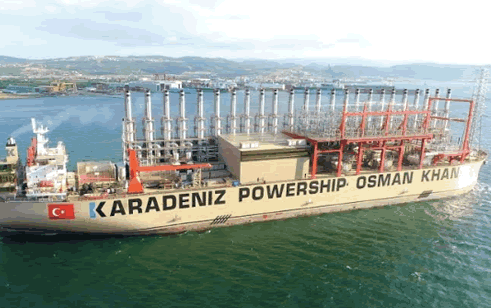Karpower barge to move to Takoradi to serve nation better – Energy Minister
 The Government has taken a decision to relocate the Karpower Barge from Tema to Takoradi to be converted into a gas-powered plant to maximise its benefits.
The Government has taken a decision to relocate the Karpower Barge from Tema to Takoradi to be converted into a gas-powered plant to maximise its benefits.
Mr John-Peter Amewu, the Minister of Energy, who announced this on Thursday, in Accra, said the relocation of the Karpower barge would create a demand for up to 90 million standard cubic feet per day (mmscfd) from the West African Gas Pipeline Company for the plant.
The outstanding gas from the Company would be evacuated to the Tema Power Enclave for power generation as well as for other industrial use.
Mr Amewu said this arrangement would ensure that the $ 40 million every month, spent on fuel to power the barge at Tema, would be saved, adding that the Government was also reviewing the agreements of other emergency power plants and would be announce its outcomes shortly.
The Minister was addressing a media conference, attended by Mr Kojo Oppong Nkrumah, who has been nominated as the Minister of Information.
Some deputy ministers and heads of Departments and Agencies, under the Energy Ministry of Energy attended the event.
He said to date they had made significant interventions that had addressed some of our concerns; explaining that to prevent gas from being stranded in Takoradi whilst the power plants in Tema lacked cheaper gas as alternative fuel, the Government decided to undertake a project that will allow for gas to reverse flow from Takoradi to Tema through the West African Gas Pipeline.
The project, he said, was expected to be completed by November this year.
“This project has become necessary because at the time the commercial contracts for the development of the OCTP gas were signed in 2015, there was no plan to fully utilise the gas to be produced although we were committed to a take or pay obligation,” he said.
The conference was to throw more light on the happenings in the energy sector, particularly, issues relating to stable power supply, power purchase agreement, electricity tariff reduction, emergency power plants, natural gas, prices of petroleum products and Bulk Oil Storage and Transportation Company Ltd (BOST).
On Emergency Power Plants, Mr Amewu recounted that during the power crises of 2013 to 2016, the then Government of President John Dramani Mahama, signed a number of emergency power plants agreements, including the Karpower plant, AMERI and AKSA plants.
He said this Government was reviewing the status of these emergency plants with the view of determining the implications of their continuous operations.
He explained that with the Karpower, the Government had taken the decision to continue the use of the plant for strategic reasons.
He, however, said, the previous government failed to put in place adequate measurers to create demand for the domestic gas to be produced from the field after the signing of the commercial agreement to develop the Offshore Cape Three Point (OCTP) field in 2015.
He said at the same time, the Government agreed to an arrangement of take-or-pay of up to 154 mmscfd; adding that, in the absence of the infrastructure to evacuate gas to the power enclave in Tema and inadequate demand for gas in Takoradi, the Ghana National Petroleum Corporation (GNPC) would be confronted with a huge bill of $40 million every month for gas not consumed.
On gas issues, Mr Amewu said: “With regard to the OCPT field development, I am happy to note that the main project has been successfully completed and gas has been flowing from the field since July this year.
“I will like to state, however, that the genuine concerns expressed by the New Patriotic Party (NPP) at the time we were in opposition have been vindicated.
“We were concerned that there was no plan to provide the infrastructure for evacuating the gas to be produced to demand centres, including the Tema Power and Industrial Enclave, which was going to leave gas stranded in Takoradi. We were worried about the high gas price negotiated by the government.”
He said the Government was working with the OCTP partners and other relevant stakeholders to execute outstanding commercial agreements between the parties for the entire project to be completed on time.
Source: GNA
